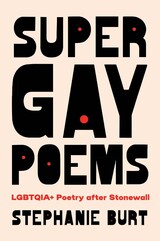18 books about Lewis, Tess
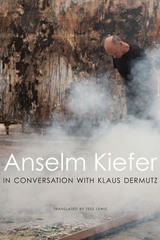
Anselm Kiefer in Conversation with Klaus Dermutz
Anselm Kiefer and Klaus Dermutz
Seagull Books, 2018
In the ten conversations with the writer and theologian Klaus Dermutz collected here, Kiefer returns to the essential elements of his art, his aesthetics, and his creative processes.
The only visual artist to have won the Peace Prize of the German Book Trade, Anselm Kiefer is a profoundly literary painter. In these conversations, Kiefer describes how the central materials of his art—lead, sand, water, fire, ashes, plants, clothing, oil paint, watercolor, and ink—influence the act of creation. No less decisive are his intellectual and artistic touchstones: the sixteenth-century Jewish mystic Isaac Luria, the German Romantic poet Novalis, Ingeborg Bachmann, Paul Celan, Martin Heidegger, Marcel Proust, Adalbert Stifter, the operas of Richard Wagner, the Catholic liturgy, and the innovative theater director and artist Tadeusz Kantor. Kiefer and Dermutz discuss all of these influential thinkers, as well as Kiefer’s own status as a controversial figure. His relentless examination of German history, the themes of guilt, suffering, communal memory, and the seductions of destruction have earned him equal amounts of criticism and praise. The conversations in this book offer a rare insight into the mind of a gifted creator, appealing to artists, critics, art historians, cultural journalists, and anyone interested in the visual arts and the literature and history of the twentieth century.
The only visual artist to have won the Peace Prize of the German Book Trade, Anselm Kiefer is a profoundly literary painter. In these conversations, Kiefer describes how the central materials of his art—lead, sand, water, fire, ashes, plants, clothing, oil paint, watercolor, and ink—influence the act of creation. No less decisive are his intellectual and artistic touchstones: the sixteenth-century Jewish mystic Isaac Luria, the German Romantic poet Novalis, Ingeborg Bachmann, Paul Celan, Martin Heidegger, Marcel Proust, Adalbert Stifter, the operas of Richard Wagner, the Catholic liturgy, and the innovative theater director and artist Tadeusz Kantor. Kiefer and Dermutz discuss all of these influential thinkers, as well as Kiefer’s own status as a controversial figure. His relentless examination of German history, the themes of guilt, suffering, communal memory, and the seductions of destruction have earned him equal amounts of criticism and praise. The conversations in this book offer a rare insight into the mind of a gifted creator, appealing to artists, critics, art historians, cultural journalists, and anyone interested in the visual arts and the literature and history of the twentieth century.
[more]

Arson
Laura Freudenthaler
Seagull Books, 2025
Set against the backdrop of escalating environmental collapse, this novel is a timely exploration of the terrifying consequences of climate change—particularly wildfires.
A feverish and unsettling meditation on climate collapse, Arson is told through the fragmented perspectives of two individuals struggling to make sense of a world consumed by fire. An unnamed narrator, a writer plagued by anxiety and writer’s block, watches as the planet, her relationships, and even her ability to dream are ravaged by environmental disaster. Meanwhile, an insomniac scientist, obsessed with tracking wildfires, clings to data as his last grip on control, meticulously recording every flame that devours the forests.
Their narratives unfold in a disorienting rhythm—one slipping between lyrical introspection and panic, the other drowning in statistics and methodical observation. As fires rage across the planet, both search for meaning and survival: the narrator wanders the charred countryside in search of life amid destruction, while the scientist compulsively documents landscapes that should never be burning. Echoing Ingeborg Bachmann’s famous words, “With my burned hand I write about the nature of fire,” Laura Freudenthaler crafts a haunting, kaleidoscopic portrait of a world on the brink. Arson is not just a novel about climate change—it is an urgent, dreamlike reckoning with our fascination and horror at the beauty and devastation wrought by fire.
A feverish and unsettling meditation on climate collapse, Arson is told through the fragmented perspectives of two individuals struggling to make sense of a world consumed by fire. An unnamed narrator, a writer plagued by anxiety and writer’s block, watches as the planet, her relationships, and even her ability to dream are ravaged by environmental disaster. Meanwhile, an insomniac scientist, obsessed with tracking wildfires, clings to data as his last grip on control, meticulously recording every flame that devours the forests.
Their narratives unfold in a disorienting rhythm—one slipping between lyrical introspection and panic, the other drowning in statistics and methodical observation. As fires rage across the planet, both search for meaning and survival: the narrator wanders the charred countryside in search of life amid destruction, while the scientist compulsively documents landscapes that should never be burning. Echoing Ingeborg Bachmann’s famous words, “With my burned hand I write about the nature of fire,” Laura Freudenthaler crafts a haunting, kaleidoscopic portrait of a world on the brink. Arson is not just a novel about climate change—it is an urgent, dreamlike reckoning with our fascination and horror at the beauty and devastation wrought by fire.
[more]

Elsewhere
Doron Rabinovici
Haus Publishing, 2010
Israeli academic Ethan Rosen is a brilliant, opinionated thinker—as is his colleague and rival, Rudi Klausinger, against whom he is pitted in a no-holds-barred competition for the sought-after professorship of cultural studies. So when Rosen condemns an article that he himself wrote, those around them wonder: Is he so confused that he can’t even recognize his own words?
A complex and moving novel about modern Jewish identity, Elsewhere takes aim at a number of sensitive issues, including nationalism, Zionism, collective guilt, the Holocaust, and Israel itself. As heartfelt and surprising as it is hilarious, it pokes fun at the things we care about in order to get at what really matters.
A complex and moving novel about modern Jewish identity, Elsewhere takes aim at a number of sensitive issues, including nationalism, Zionism, collective guilt, the Holocaust, and Israel itself. As heartfelt and surprising as it is hilarious, it pokes fun at the things we care about in order to get at what really matters.
[more]

In the Forest of Metropoles
Karl-Markus Gauß
Seagull Books, 2024
A chronicle of the diversity and wealth of cultures, predominantly from Eastern Europe, that have played a formative role in shaping contemporary Europe but now risk being forgotten.
A Herodotus of Mitteleuropa, cultural historian Karl-Markus Gauß is essential reading for anyone trying to understand the breadth and complexities of cultures and societies in Europe before, during, and after its decades of division in the twentieth century.
In this book, Gauß takes his readers on a thirteen-station journey across Europe. From Brussels to Istanbul and from Naples to Opole, Gauß weaves a Sebaldian web of connection and coincidence into a hybrid cultural history. Significantly, Gauß’s metropoles are not the well-trodden, thoroughly explored, and minutely documented megalopolises and cultural capitals that have been mythologized by writers great and small. There are no visits to Berlin, Paris, Rome, or Madrid, although he does make time for Vienna, where he looks not for imperial remnants, but for traces of genius unrecognized by most. Gauß’s lodestars are small but cosmopolitan towns on the periphery, such as Slaghenaufi, Vacaresti, Fontevraud, Dragatus, Vrzdenec, and Sélestat. In these far-flung towns, Gauß assembles a canon of overlooked humanists, expelled or extinguished by political and historical forces that swept the continent.
A Herodotus of Mitteleuropa, cultural historian Karl-Markus Gauß is essential reading for anyone trying to understand the breadth and complexities of cultures and societies in Europe before, during, and after its decades of division in the twentieth century.
In this book, Gauß takes his readers on a thirteen-station journey across Europe. From Brussels to Istanbul and from Naples to Opole, Gauß weaves a Sebaldian web of connection and coincidence into a hybrid cultural history. Significantly, Gauß’s metropoles are not the well-trodden, thoroughly explored, and minutely documented megalopolises and cultural capitals that have been mythologized by writers great and small. There are no visits to Berlin, Paris, Rome, or Madrid, although he does make time for Vienna, where he looks not for imperial remnants, but for traces of genius unrecognized by most. Gauß’s lodestars are small but cosmopolitan towns on the periphery, such as Slaghenaufi, Vacaresti, Fontevraud, Dragatus, Vrzdenec, and Sélestat. In these far-flung towns, Gauß assembles a canon of overlooked humanists, expelled or extinguished by political and historical forces that swept the continent.
[more]
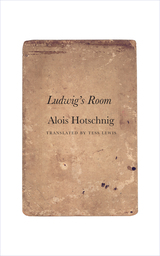
Ludwig's Room
Alois Hotschnig
Seagull Books, 2014
When Kurt Weber inherits his great-uncle’s lakeside house, he finds traces of the dark secrets of his family’s past. The early inhabitants of the house haunt his dreams nightly. And one day a ghostlike woman appears before him, hiding herself in a room that had been kept locked throughout his childhood. Inside, Kurt finds a hidden stash of photographs, letters, and documents. As he deciphers them, he gradually understands the degree of complicity in wartime horrors by his family and among his neighbors.
As the story unfolds, it becomes clear that the entire village adheres to an old and widely understood agreement not to expose the many members in the community who had been involved with a nearby prison camp during World War II. This knowledge wraps the entire community—those involved, and those who know of the involvement—in inescapable guilt for generations. Translated from the original German by Tess Lewis, Ludwig’s Room is a story of love, betrayal, honor, and cowardice, as well as the burden of history and the moral demands of the present.
As the story unfolds, it becomes clear that the entire village adheres to an old and widely understood agreement not to expose the many members in the community who had been involved with a nearby prison camp during World War II. This knowledge wraps the entire community—those involved, and those who know of the involvement—in inescapable guilt for generations. Translated from the original German by Tess Lewis, Ludwig’s Room is a story of love, betrayal, honor, and cowardice, as well as the burden of history and the moral demands of the present.
[more]

My Mother's Silver Fox
Alois Hotschnig
Seagull Books, 2025
A gripping, deeply moving novel about one man’s search for truth and identity in the long shadow of war.
Heinz Fitz has only one tangible clue to his past: a worn piece of paper from the SS-Lebensborn program, a Nazi initiative designed to promote so-called racial purity. His mother, a Norwegian woman, fell in love with the wrong man—an Austrian soldier—during the German occupation. Betrayed and abandoned, she fled to Austria, only to be turned away by his family. Branded a collaborator in her homeland and a pariah in a foreign land, she was left to survive as best she could. Now, years later, her son is determined to piece together the fragments of his origins.
But every answer leads to more questions, and as he unearths painful truths, an alternative story—one of resilience, love, and survival—emerges from the darkness. Inspired by real events, Alois Hotschnig’s novel is both a fierce reckoning with history and a poignant tribute to a mother’s strength. A masterful meditation on memory and storytelling, My Mother’s Silver Fox asks whether the past can ever truly be understood—or if it will always slip through our grasp, like snow through our fingers.
Heinz Fitz has only one tangible clue to his past: a worn piece of paper from the SS-Lebensborn program, a Nazi initiative designed to promote so-called racial purity. His mother, a Norwegian woman, fell in love with the wrong man—an Austrian soldier—during the German occupation. Betrayed and abandoned, she fled to Austria, only to be turned away by his family. Branded a collaborator in her homeland and a pariah in a foreign land, she was left to survive as best she could. Now, years later, her son is determined to piece together the fragments of his origins.
But every answer leads to more questions, and as he unearths painful truths, an alternative story—one of resilience, love, and survival—emerges from the darkness. Inspired by real events, Alois Hotschnig’s novel is both a fierce reckoning with history and a poignant tribute to a mother’s strength. A masterful meditation on memory and storytelling, My Mother’s Silver Fox asks whether the past can ever truly be understood—or if it will always slip through our grasp, like snow through our fingers.
[more]
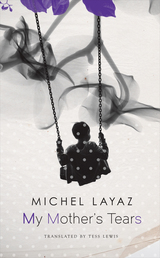
My Mother’s Tears
Michel Layaz
Seagull Books, 2019
With subtle, bemused humor and an unerring eye for human frailty, Michel Layaz writes about the hidden tensions within families, the awkwardness of adolescence, and the drama of intimacy between friends and lovers. His fifth novel, My Mother’s Tears, is his most poignant yet.
The adult narrator of My Mother’s Tears has returned to clean out his childhood home after his mother’s death. In thirty short chapters, each focused on a talismanic object or resonant episode from his childhood, the narrator tries to solve the mystery behind the flood of tears with which his strikingly beautiful, intelligent, and inscrutable mother greeted his birth. Like insects preserved in amber, these objects—an artificial orchid, a statue, a pair of green pumps, a steak knife, a fishing rod and reel, among others—are surrounded by an aura that permeates the narrator’s life. Interspersed with these chapters are fragments from the narrator’s conversation with his present lover, a woman who demands that he verbally confront his past. This difficult conversation charts his gradual liberation from the psychological wounds he suffered growing up.
Not only an account of a son’s attempt to understand his enigmatic mother, My Mother’s Tears is also a moving novel about language and memory that explores the ambivalent power of words to hurt and to heal, to revive the past and to put childhood demons to rest.
The adult narrator of My Mother’s Tears has returned to clean out his childhood home after his mother’s death. In thirty short chapters, each focused on a talismanic object or resonant episode from his childhood, the narrator tries to solve the mystery behind the flood of tears with which his strikingly beautiful, intelligent, and inscrutable mother greeted his birth. Like insects preserved in amber, these objects—an artificial orchid, a statue, a pair of green pumps, a steak knife, a fishing rod and reel, among others—are surrounded by an aura that permeates the narrator’s life. Interspersed with these chapters are fragments from the narrator’s conversation with his present lover, a woman who demands that he verbally confront his past. This difficult conversation charts his gradual liberation from the psychological wounds he suffered growing up.
Not only an account of a son’s attempt to understand his enigmatic mother, My Mother’s Tears is also a moving novel about language and memory that explores the ambivalent power of words to hurt and to heal, to revive the past and to put childhood demons to rest.
[more]
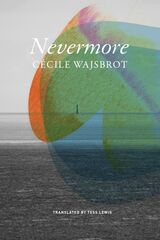
Nevermore
Cécile Wajsbrot
Seagull Books, 2024
A meditation on loss and recovery through the act of translation and its recuperative powers.
An unnamed translator mourning the loss of a close friend retreats to Dresden to translate the “Time Passes” section of Virginia Woolf’s novel To the Lighthouse. Translating this lyrical evocation of time and its devastations in a city with which the writer has no connections and where neither her language nor Woolf’s are spoken offers an interruption to the course of her life. She immerses herself in this prose poem of ephemerality.
The narrator delves into phrases from “Time Passes” and subjects them to the inexact science and imperfect art of translation. This, in turn, leads her to wide-ranging reflections on other instances of loss, destruction, and recovery—the Chernobyl disaster, the High Line in New York City, the bombing of Dresden and Wallmann’s commemorative Bell Requiem Dresden, the evacuation of the Hebridean island Foula, Hiroshi Sugimoto’s photographs of seascapes, Debussy’s “La cathédrale engloutie,” and Ceri Richards’s series of paintings by the same name. She reflects on places that are destined for decay and yet are returning to life, broken worlds in which there is still strength for a new beginning. In Tess Lewis’s visionary English translation, Cécile Wajsbrot’s lyrical exploration of the role of the writer and translator becomes an exquisite meditation on loss and recovery.
An unnamed translator mourning the loss of a close friend retreats to Dresden to translate the “Time Passes” section of Virginia Woolf’s novel To the Lighthouse. Translating this lyrical evocation of time and its devastations in a city with which the writer has no connections and where neither her language nor Woolf’s are spoken offers an interruption to the course of her life. She immerses herself in this prose poem of ephemerality.
The narrator delves into phrases from “Time Passes” and subjects them to the inexact science and imperfect art of translation. This, in turn, leads her to wide-ranging reflections on other instances of loss, destruction, and recovery—the Chernobyl disaster, the High Line in New York City, the bombing of Dresden and Wallmann’s commemorative Bell Requiem Dresden, the evacuation of the Hebridean island Foula, Hiroshi Sugimoto’s photographs of seascapes, Debussy’s “La cathédrale engloutie,” and Ceri Richards’s series of paintings by the same name. She reflects on places that are destined for decay and yet are returning to life, broken worlds in which there is still strength for a new beginning. In Tess Lewis’s visionary English translation, Cécile Wajsbrot’s lyrical exploration of the role of the writer and translator becomes an exquisite meditation on loss and recovery.
[more]
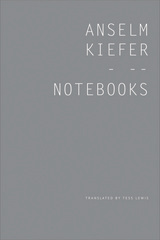
Notebooks, Volume 1, 1998-99
Anselm Kiefer
Seagull Books, 2015
“For a long time, it was not clear if I would become a writer or an artist,” says Anselm Kiefer, whose paintings and sculptures have made him one of the most significant and influential artists of our time. Since he was awarded the Peace Prize by the German Book Trade in 2008, his essays, speeches, and lectures have gradually received more attention, but until now his diary accounts have been almost completely unknown. The power in Kiefer’s images, however, is rivaled by his writings on nature and history, literature and antiquity, and mysticism and mythology.
The first volume of Notebooks spans the years 1998-1999 and traces the origins and creative process of Kiefer’s visual works during this period. In this volume, Kiefer returns constantly to his touchstones: sixteenth-century alchemist Robert Fludd, German romantic poet Novalis, Martin Heidegger, Ingeborg Bachmann, Robert Musil, and many other writers and thinkers. The entries reveal the process by which his artworks are informed by his reading—and vice versa—and track the development of the works he created in the late 1990s. Translated into English for the first time by Tess Lewis, the diaries reveal Kiefer’s strong affinity for language and let readers witness the process of thoughts, experiences, and adventures slowly transcending the limits of art, achieving meaning in and beyond their medium.
Praise for Kiefer
“His works recall, in this sense, the grand tradition of history painting, with its notion about the elevated role of art in society, except that they do not presume moral certainty. What makes Kiefer’s work so convincing . . . is precisely its ambiguity and self-doubt, its rejection of easy solutions, historical amnesia, and transcendence.”—New York Times
“Wordiness for Kiefer is painterliness. The library and the gallery, the book and the frame inseparable, even interchangeable, in his monumental archive of human memory. Not since Picasso’s Guernica have pictures demanded so urgently that we studiously reflect and recollect in their presence.”—Simon Schama
The first volume of Notebooks spans the years 1998-1999 and traces the origins and creative process of Kiefer’s visual works during this period. In this volume, Kiefer returns constantly to his touchstones: sixteenth-century alchemist Robert Fludd, German romantic poet Novalis, Martin Heidegger, Ingeborg Bachmann, Robert Musil, and many other writers and thinkers. The entries reveal the process by which his artworks are informed by his reading—and vice versa—and track the development of the works he created in the late 1990s. Translated into English for the first time by Tess Lewis, the diaries reveal Kiefer’s strong affinity for language and let readers witness the process of thoughts, experiences, and adventures slowly transcending the limits of art, achieving meaning in and beyond their medium.
Praise for Kiefer
“His works recall, in this sense, the grand tradition of history painting, with its notion about the elevated role of art in society, except that they do not presume moral certainty. What makes Kiefer’s work so convincing . . . is precisely its ambiguity and self-doubt, its rejection of easy solutions, historical amnesia, and transcendence.”—New York Times
“Wordiness for Kiefer is painterliness. The library and the gallery, the book and the frame inseparable, even interchangeable, in his monumental archive of human memory. Not since Picasso’s Guernica have pictures demanded so urgently that we studiously reflect and recollect in their presence.”—Simon Schama
[more]

Notebooks, Volume 1, 1998-99
Anselm Kiefer
Seagull Books, 2015
“For a long time, it was not clear if I would become a writer or an artist,” says Anselm Kiefer, whose paintings and sculptures have made him one of the most significant and influential artists of our time. Since he was awarded the Peace Prize by the German Book Trade in 2008, his essays, speeches, and lectures have gradually received more attention, but until now his diary accounts have been almost completely unknown. The power in Kiefer’s images, however, is rivaled by his writings on nature and history, literature and antiquity, and mysticism and mythology.
The first volume of Notebooks spans the years 1998-1999 and traces the origins and creative process of Kiefer’s visual works during this period. In this volume, Kiefer returns constantly to his touchstones: sixteenth-century alchemist Robert Fludd, German romantic poet Novalis, Martin Heidegger, Ingeborg Bachmann, Robert Musil, and many other writers and thinkers. The entries reveal the process by which his artworks are informed by his reading—and vice versa—and track the development of the works he created in the late 1990s. Translated into English for the first time by Tess Lewis, the diaries reveal Kiefer’s strong affinity for language and let readers witness the process of thoughts, experiences, and adventures slowly transcending the limits of art, achieving meaning in and beyond their medium.
Praise for Kiefer
“His works recall, in this sense, the grand tradition of history painting, with its notion about the elevated role of art in society, except that they do not presume moral certainty. What makes Kiefer’s work so convincing . . . is precisely its ambiguity and self-doubt, its rejection of easy solutions, historical amnesia, and transcendence.”—New York Times
“Wordiness for Kiefer is painterliness. The library and the gallery, the book and the frame inseparable, even interchangeable, in his monumental archive of human memory. Not since Picasso’s Guernica have pictures demanded so urgently that we studiously reflect and recollect in their presence.”—Simon Schama
The first volume of Notebooks spans the years 1998-1999 and traces the origins and creative process of Kiefer’s visual works during this period. In this volume, Kiefer returns constantly to his touchstones: sixteenth-century alchemist Robert Fludd, German romantic poet Novalis, Martin Heidegger, Ingeborg Bachmann, Robert Musil, and many other writers and thinkers. The entries reveal the process by which his artworks are informed by his reading—and vice versa—and track the development of the works he created in the late 1990s. Translated into English for the first time by Tess Lewis, the diaries reveal Kiefer’s strong affinity for language and let readers witness the process of thoughts, experiences, and adventures slowly transcending the limits of art, achieving meaning in and beyond their medium.
Praise for Kiefer
“His works recall, in this sense, the grand tradition of history painting, with its notion about the elevated role of art in society, except that they do not presume moral certainty. What makes Kiefer’s work so convincing . . . is precisely its ambiguity and self-doubt, its rejection of easy solutions, historical amnesia, and transcendence.”—New York Times
“Wordiness for Kiefer is painterliness. The library and the gallery, the book and the frame inseparable, even interchangeable, in his monumental archive of human memory. Not since Picasso’s Guernica have pictures demanded so urgently that we studiously reflect and recollect in their presence.”—Simon Schama
[more]
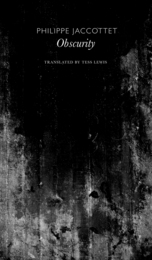
Obscurity
Philippe Jaccottet
Seagull Books, 2015
The story of an intense encounter between two men who were once very close and now must grapple with the fractured ideals that separate them.
After several years abroad, a young man returns to his hometown to seek the man he calls master. This master, a brilliant philosopher, had made the young man into a disciple before sending him out into the world to put his teachings into practice. Returning three years later, the disciple finds his master has abandoned his wife and child and moved into a squalid one-room flat, cutting himself off completely from his former life. Disillusioned and reeling from the discovery, the young man spends an entire night listening to his master’s bitter denunciation of the ideals they once shared. Written in 1960 during Jaccottet’s period of poetic paralysis, the novel seeks to harmonize the best and worst of human nature—reconciling despair, falsehood, and lethargy of spirit with the need to remain open to beauty, truth, and the essential goodness of humankind. Translated by Tess Lewis, Obscurity is Jaccottet’s only work of fiction, one that will introduce new readers to the multifaceted skills of this major poet.
After several years abroad, a young man returns to his hometown to seek the man he calls master. This master, a brilliant philosopher, had made the young man into a disciple before sending him out into the world to put his teachings into practice. Returning three years later, the disciple finds his master has abandoned his wife and child and moved into a squalid one-room flat, cutting himself off completely from his former life. Disillusioned and reeling from the discovery, the young man spends an entire night listening to his master’s bitter denunciation of the ideals they once shared. Written in 1960 during Jaccottet’s period of poetic paralysis, the novel seeks to harmonize the best and worst of human nature—reconciling despair, falsehood, and lethargy of spirit with the need to remain open to beauty, truth, and the essential goodness of humankind. Translated by Tess Lewis, Obscurity is Jaccottet’s only work of fiction, one that will introduce new readers to the multifaceted skills of this major poet.
[more]
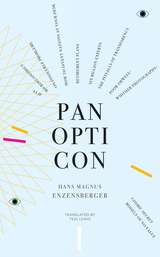
Panopticon
Hans Magnus Enzensberger
Seagull Books, 2018
A collection of daring short essays on topical themes, including politics, economics, religion, society.
Hans Magnus Enzensberger takes the title for this collection not from Jeremy Bentham’s famous prison but from a mid-1930s Cabinet of Curiosities opened in Germany by Karl Valentin. “There,” writes Enzensberger, “viewers could admire, along with implements of torture, all manner of abnormalities and sensational inventions.” And that’s what he offers here: a wide-ranging, surprising look at all manner of strange aspects of our contemporary world.
As masterly with the essay as he is with fiction and poetry, Enzensberger here presents complicated thoughts with a light touch, tying new iterations of old ideas to their antecedents, quoting liberally from his forebears, and presenting himself unapologetically as not an expert but a seeker. Enzensberger the essayist works in the mode of Montaigne, unafraid to take his reader in unexpected directions, knowing that the process of exploration is often in itself sufficient reward for following a line of thought. In an era that regularly laments the death of the public intellectual, Enzensberger is the real deal: a towering figure in German literature who refuses to let his mind or work be bound by the narrow world of the poetry or fiction section.
Hans Magnus Enzensberger takes the title for this collection not from Jeremy Bentham’s famous prison but from a mid-1930s Cabinet of Curiosities opened in Germany by Karl Valentin. “There,” writes Enzensberger, “viewers could admire, along with implements of torture, all manner of abnormalities and sensational inventions.” And that’s what he offers here: a wide-ranging, surprising look at all manner of strange aspects of our contemporary world.
As masterly with the essay as he is with fiction and poetry, Enzensberger here presents complicated thoughts with a light touch, tying new iterations of old ideas to their antecedents, quoting liberally from his forebears, and presenting himself unapologetically as not an expert but a seeker. Enzensberger the essayist works in the mode of Montaigne, unafraid to take his reader in unexpected directions, knowing that the process of exploration is often in itself sufficient reward for following a line of thought. In an era that regularly laments the death of the public intellectual, Enzensberger is the real deal: a towering figure in German literature who refuses to let his mind or work be bound by the narrow world of the poetry or fiction section.
[more]
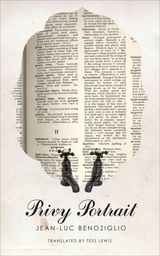
Privy Portrait
Jean-Luc Benoziglio
Seagull Books, 2014
The narrator in Jean-Luc Benoziglio’s Privy Portrait has fallen on hard times. His wife and young daughter have abandoned him, he has no work or prospects, he’s blind in one eye, and he must move into a horribly tiny apartment with his only possession: a twenty-five-volume encyclopedia. His neighbors, the Shritzkys, are vulgar, narrow-minded, and racist. And because he has no space for his encyclopedia in his cramped room, he stores it in the communal bathroom, and this becomes a major point of contention with his neighbors. The bathroom is also the only place he can find refuge from the Shritzkys’ blaring television, and he barricades himself in it to read his encyclopedia, much to the chagrin of the rest of the residents of the building.
Darkly amusing, Privy Portrait is the monologue of a man, disoriented by the gaping void of not knowing his own nationality, recounting the final remnants of his own sanity and his life. In this buffoonish, even grotesque, yet deeply pitiful man, Benoziglio explores, with a light yet profound touch, weighty themes such as the roles of family, history, one’s moral responsibility towards others, and the fragility of personal identity.
Darkly amusing, Privy Portrait is the monologue of a man, disoriented by the gaping void of not knowing his own nationality, recounting the final remnants of his own sanity and his life. In this buffoonish, even grotesque, yet deeply pitiful man, Benoziglio explores, with a light yet profound touch, weighty themes such as the roles of family, history, one’s moral responsibility towards others, and the fragility of personal identity.
[more]
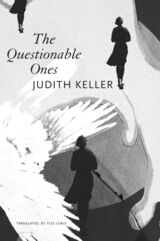
The Questionable Ones
Judith Keller
Seagull Books, 2023
A brilliant collection of micro-fiction, reflecting our fragmented times.
With quirky humor and wry insight, Swiss author Judith Keller’s micro-fictions unravel the fabric of daily life. She delves into the aporia of language by taking idiomatic expressions literally, unpacking the multiple meanings of words, and confounding expectations. Seven Zurich tram stops provide the framework for these familiar yet absurd portraits of passers-by, fellow passengers on the tram, the unemployed and the overemployed, the innocent and the suspicious, young mothers and confused elderly. The reader is taken on a journey through the city and offered glimpses of people going more or less successfully about their lives. These deceptively banal glimpses, however, show us more than we expect—they turn the lens back on us, puncture our complacency and ask, "Who are you to judge?"
The characters are hapless and far-fetched, trying to find their footing on shifting ground and grateful for what happiness they can find. In just a sentence or two, Keller unlocks metaphysical trapdoors. The Questionable Ones offers a collection of snapshots that reveal the extraordinary lurking inside the ordinary and the ordinary at the core of the extraordinary.
With quirky humor and wry insight, Swiss author Judith Keller’s micro-fictions unravel the fabric of daily life. She delves into the aporia of language by taking idiomatic expressions literally, unpacking the multiple meanings of words, and confounding expectations. Seven Zurich tram stops provide the framework for these familiar yet absurd portraits of passers-by, fellow passengers on the tram, the unemployed and the overemployed, the innocent and the suspicious, young mothers and confused elderly. The reader is taken on a journey through the city and offered glimpses of people going more or less successfully about their lives. These deceptively banal glimpses, however, show us more than we expect—they turn the lens back on us, puncture our complacency and ask, "Who are you to judge?"
The characters are hapless and far-fetched, trying to find their footing on shifting ground and grateful for what happiness they can find. In just a sentence or two, Keller unlocks metaphysical trapdoors. The Questionable Ones offers a collection of snapshots that reveal the extraordinary lurking inside the ordinary and the ordinary at the core of the extraordinary.
[more]

The Second Seedtime
Notebooks, 1980–94
Philippe Jaccottet
Seagull Books, 2017
The second volume of notes and reflections from one of Switzerland’s most prominent and prolific men of letters.
One of Europe’s finest contemporary poets, Jaccottet is a writer of exacting attention. Through keen observations of the natural world, art, literature, and music, and reflections on the human condition, Jaccottet opens his readers’ eyes to the transcendent in everyday life. The Second Seedtime is a collection of “things seen, things read, and things dreamed.” The volume continues the project Jaccottet began three decades earlier in his first volume of notebooks, Seedtime. Here, again, he gathers flashes of beauty dispersed around him like seeds that may blossom into poems or moments of inspiration. He returns, insistently, to such literary touchstones as Dante, Montaigne, Góngora, Goethe, Kierkegaard, Hölderlin, Michaux, Hopkins, Brontë, and Dickinson, as well as musical greats including Bach, Monteverdi, Purcell, and Schubert. The Second Seedtime is the vivid chronicle of one man’s passionate engagement with the life of the mind, the spirit, and the natural world.
One of Europe’s finest contemporary poets, Jaccottet is a writer of exacting attention. Through keen observations of the natural world, art, literature, and music, and reflections on the human condition, Jaccottet opens his readers’ eyes to the transcendent in everyday life. The Second Seedtime is a collection of “things seen, things read, and things dreamed.” The volume continues the project Jaccottet began three decades earlier in his first volume of notebooks, Seedtime. Here, again, he gathers flashes of beauty dispersed around him like seeds that may blossom into poems or moments of inspiration. He returns, insistently, to such literary touchstones as Dante, Montaigne, Góngora, Goethe, Kierkegaard, Hölderlin, Michaux, Hopkins, Brontë, and Dickinson, as well as musical greats including Bach, Monteverdi, Purcell, and Schubert. The Second Seedtime is the vivid chronicle of one man’s passionate engagement with the life of the mind, the spirit, and the natural world.
[more]
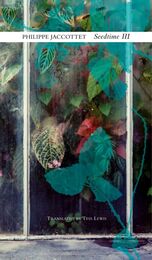
Seedtime III
Notebooks, 1995–1998
Phlippe Jaccottet
Seagull Books, 2021
Writers’ notebooks sometimes prove more revelatory than diaries or intimate journals. At first they might appear to be rag-and-bone shops of ideas, insights, hesitations, doubts, and records of things seen, heard, read, dreamt. But eventually they coalesce into a labyrinthine map of the creative process. Swiss poet Philippe Jaccottet has faithfully kept notebooks for many decades, and the selections that make up the Seedtime volumes have retained a vividness of insight and discovery despite the passage of time. After all, as the poet himself says, his notebooks are “a collection of delicate seeds with which I try to replant my ‘spiritual forest.’”
Seedtime III, which brings this series to a close, records numerous fleeting thoughts, ephemeral experiences, and philosophical observations from a renowned poet well into his seventies, charting the single steps—sometimes forwards, sometimes back—taken in a lifelong attempt to transcend the limits of art. The inconclusive nature of the notebook entries, their tentativeness and lack of resolution, renders them as intriguing and evocative as some of Jaccottet’s best works. In them readers will find a life full of the kind of contemplation that attracts yet eludes most of us in our daily existence.
Seedtime III, which brings this series to a close, records numerous fleeting thoughts, ephemeral experiences, and philosophical observations from a renowned poet well into his seventies, charting the single steps—sometimes forwards, sometimes back—taken in a lifelong attempt to transcend the limits of art. The inconclusive nature of the notebook entries, their tentativeness and lack of resolution, renders them as intriguing and evocative as some of Jaccottet’s best works. In them readers will find a life full of the kind of contemplation that attracts yet eludes most of us in our daily existence.
[more]
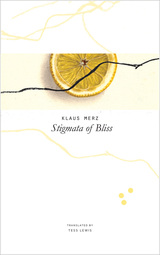
Stigmata of Bliss
Three Novellas
Klaus Merz
Seagull Books, 2017
Klaus Merz is one of the most prominent, prolific, and versatile Swiss writers working today. Celebrated as a master of concise, condensed sentences, Merz brings depth and resonance to spare narratives with lyrical prose and striking images. Stigmata of Bliss brings together three of Merz’s critically acclaimed novellas, offering English readers the perfect introduction to his work.
Jacob Asleep introduces a family marked by illness, eccentricity, and a child’s death. In A Man’s Fate, a moment of inattention on a mountainous hike upends a teacher’s life and his understanding of mortality. And finally, The Argentine traces the fluctuations of memory and desire in a man’s journey around the world. In each novella, Merz takes readers on a profound and intimate journey. Read as a whole, the works complement, enrich, and echo each other.
Jacob Asleep introduces a family marked by illness, eccentricity, and a child’s death. In A Man’s Fate, a moment of inattention on a mountainous hike upends a teacher’s life and his understanding of mortality. And finally, The Argentine traces the fluctuations of memory and desire in a man’s journey around the world. In each novella, Merz takes readers on a profound and intimate journey. Read as a whole, the works complement, enrich, and echo each other.
[more]

Tamangur
Leta Semadeni
Seagull Books, 2025
A hauntingly beautiful debut novel that interweaves grief, memory, and the mystical realm of an ancient forest through eighty-four poignant vignettes.
Romansh poet Leta Semadeni’s debut novel, Tamangur, is a multifaceted gem that delves into the shadowed depths of a remote valley in the Engadin Alps. More than a setting, the ancient stone pine forest of Tamangur serves as a mystical realm, a Valhalla for hunters and their kin, where the living brush against the world of the dead.
A richly woven narrative, Tamangur unfolds through eighty-four interlocking vignettes. We follow an unnamed young girl, referred to only as “the child,” and her grandmother as they navigate their shared grief. The loss of the girl’s beloved grandfather and younger brother casts a long shadow, with the child believing she is to blame for her brother’s death—a burden that has led her parents to abandon her. The small village they inhabit is populated by a cast of quirky characters: Elsa, who passionately loves the absent Elvis; a seamstress who steals others’ memories; a brooding chimney sweep; and a rude goat. Amidst the sorrow, these oddballs form a patchwork family, softening the harsh edges of fate with their peculiar charm.
Semadeni’s prose is crystalline and evocative, blending the poignant with the absurd in a way that captures the heart and imagination. Tamangur is a haunting exploration of loss, memory, and the fragile connections that bind us.
Romansh poet Leta Semadeni’s debut novel, Tamangur, is a multifaceted gem that delves into the shadowed depths of a remote valley in the Engadin Alps. More than a setting, the ancient stone pine forest of Tamangur serves as a mystical realm, a Valhalla for hunters and their kin, where the living brush against the world of the dead.
A richly woven narrative, Tamangur unfolds through eighty-four interlocking vignettes. We follow an unnamed young girl, referred to only as “the child,” and her grandmother as they navigate their shared grief. The loss of the girl’s beloved grandfather and younger brother casts a long shadow, with the child believing she is to blame for her brother’s death—a burden that has led her parents to abandon her. The small village they inhabit is populated by a cast of quirky characters: Elsa, who passionately loves the absent Elvis; a seamstress who steals others’ memories; a brooding chimney sweep; and a rude goat. Amidst the sorrow, these oddballs form a patchwork family, softening the harsh edges of fate with their peculiar charm.
Semadeni’s prose is crystalline and evocative, blending the poignant with the absurd in a way that captures the heart and imagination. Tamangur is a haunting exploration of loss, memory, and the fragile connections that bind us.
[more]
READERS
Browse our collection.
PUBLISHERS
See BiblioVault's publisher services.
STUDENT SERVICES
Files for college accessibility offices.
UChicago Accessibility Resources
home | accessibility | search | about | contact us
BiblioVault ® 2001 - 2025
The University of Chicago Press


